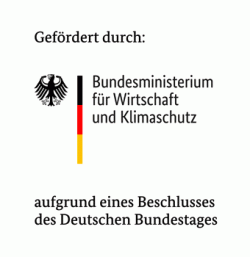Hydrogen combustion in stationary gas engines
Description of project

This joint project (H2VKM), funded by the German Federal Ministry of Economics and Climate Protection, is concerned with the combustion of gaseous fuel from pure hydrogen in stationary combustion engines for decentralized power generation.
The sub-project of WTZ Roßlau gGmbH has the overall objective of converting and operating a high-performance natural gas genset for clean and safe operation with 100% hydrogen in cooperation with Caterpillar Energy Solutions GmbH. This goal can be broken down into three individual development goals, which are being worked out in the research network.
The first objective is to gain an in-depth insight into the differences in combustion behavior between natural gas and hydrogen by looking at engine operation with gradual substitution of natural gas for hydrogen. The theoretical basis will be developed through a literature review and the exchange of experiences between the project partners. This knowledge is to be used in the design and development of a gas supply line for engine operation at the WTZ Roßlau. The initial investigations will focus on engine performance in various operating modes with variable hydrogen contents.
The second goal is the conversion and operation of the test vehicle with a focus on optimizing the efficiency in 100% hydrogen gas mixer operation and the implementation of the developed safety concept on an engine test bench at WTZ Roßlau gGmbH. To implement the safety concept for the safe handling of hydrogen on the engine test bench, appropriate technological adaptations are being developed and implemented, and employees are being trained. In addition to modifications to the gas supply, turbocharging and safety systems, changes are made to engine mechanical components such as pistons and valve timing.
The third objective is to design, procure and adapt a port fuel injection gas system, and implement it on the full engine to increase engine power and further increase efficiency. In trial operation, corresponding adjustments are made in the engine control system and transferred to the requirements of the injection system. The data obtained, as well as the experimental components, will be studied in terms of engine performance, emission, hydrogen resistance and safety.
